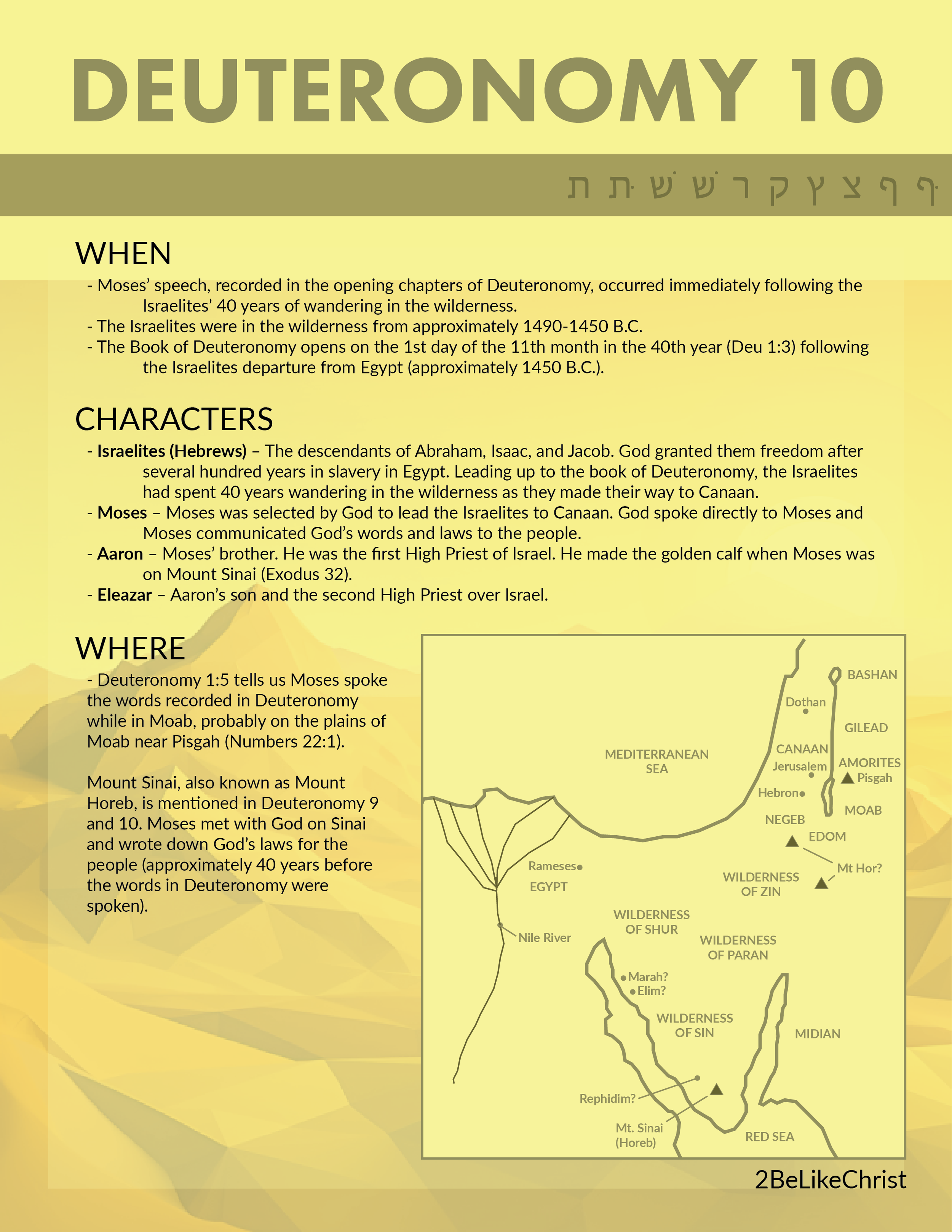Deuteronomy 10 Summary - 5 Minute Bible Study
Deuteronomy 10 Summary - A Quick Overview
WHEN:
Moses’ speech, recorded in the opening chapters of Deuteronomy, occurred immediately following the Israelites’ 40 years of wandering in the wilderness.
The Israelites were in the wilderness from approximately 1490-1450 B.C.
The Book of Deuteronomy opens on the 1st day of the 11th month in the 40th year (Deu 1:3) following the Israelites departure from Egypt (approximately 1450 B.C.).
CHARACTERS:
Israelites (Hebrews) – The descendants of Abraham, Isaac, and Jacob. God granted them freedom after several hundred years in slavery in Egypt. Leading up to the book of Deuteronomy, the Israelites had spent 40 years wandering in the wilderness as they made their way to Canaan, the land God promised to give them as a home.
Moses – Moses was selected by God to lead the Israelites to Canaan. God spoke directly to Moses and Moses communicated God’s words and laws to the people.
Aaron – Moses’ brother. He was the first High Priest of Israel. He made the golden calf when Moses was on Mount Sinai (Exodus 32).
Eleazar – Aaron’s son and the second High Priest over Israel.
WHERE:
Deuteronomy 1:5 tells us Moses spoke the words recorded in Deuteronomy while in Moab, probably on the plains of Moab near Pisgah (Numbers 22:1).
Mount Sinai, also known as Mount Horeb, is mentioned in Deuteronomy 9 and 10. Moses met with God on Sinai and wrote down God’s laws for the people (approximately 40 years before the words in Deuteronomy were spoken).
OUTLINE:
NEW TABLETS FOR THE 10 COMMANDMENTS (10:1-5):
In chapter 9, Moses recounted the Israelites’ disobedience to God when they made an idol, a gold calf, at Mount Sinai (Horeb).
Moses was so angry when he saw the calf he threw the tablets, on which the 10 Commandments were written, on the ground and broke them.
Moses opens chapter 10 by reminding the people how he and God made 2 new tablets and rewrote the law after the golden calf was destroyed.
NEW HIGH PRIEST AFTER THE DEATH OF AARON (10:6-9):
God’s mercy was shown when He gave the people a new copy of the 10 commandments, and it was shown again when He gave the people a new High Priest after the death of Aaron.
Aaron died while the Israelites were in the wilderness and God appointed his son, Eleazar to take his place.
MOSES PLEADS FOR THE PEOPLE (10:10-11):
Moses also reminded the people how he plead with God on Sinai not to destroy them after they repeatedly sinned following their departure from Egypt.
Moses was recounting all these events to prove the point he made in the last chapter, that the Israelites were not going to inherit Canaan because of their righteousness, but because of God’s mercy.
MOSES CALLS ISRAEL TO FAITHFULNESS (10:12-22):
Moses said, “And now, Israel, what does the LORD your God require of you, but to fear the LORD your God, to walk in all his ways, to love him, to serve the LORD your God with all your heart and with all your soul, and to keep the commandments and statutes of the LORD, which I am commanding you today for your good?” (10:12-13).
God wanted the people to circumcise their hearts. They were all physically circumcised (all descendants of Abraham were as a sign of God’s covenant with them, Gen 17:10) but God wanted His covenant to have more than just a physical/external effect on a person, He wanted the people of Israel to appreciate His covenant with them to the point of it changing them internally, in their hearts.
Moses concludes this chapter extolling God as the “God of gods and Lord of lords,” and calls on the Israelites to appreciate all He had done for them and their forefathers.
APPLICATION:
Remember, the chapter divisions in our modern Bibles weren’t added by the original authors, and sometimes they can interrupt the flow of thought and be detrimental to our comprehension.
I had a difficult time understanding why Moses started this chapter talking about the tablets for the 10 Commandments and Eleazar taking his father’s role as High Priest until I connected those thoughts back to the point Moses was making in the last chapter.
Our organization of the Bible into chapters and verses is very helpful, but remember it isn’t part of the original writing. Occasionally, you’ll run across a poorly placed chapter break that splits a thought in half.
You can buy Bibles that remove chapter and verse divisions and I think they are handy for reading the Bible as it was intended to be read.


